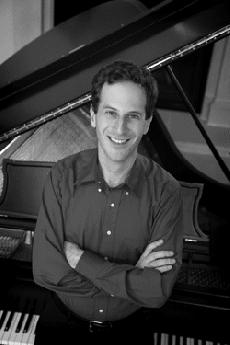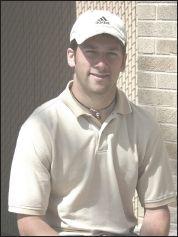
(Michael Mizrahi)
Assistant Professor of Music Michael Mizrahi came to Lawrence in 2009, fresh from several years within the New York City classical music scene. A graduate of the University of Virginia with a bachelor’s degree in religion and music and the Yale School of Music with a master’s degree in piano performance, Mizrahi nurtures a holistic musical life that includes both teaching and performing.Kim: You were originally a physics major during your undergraduate years. What got you into a music career?
Mizrahi: I started out as a physics major and ended up with a physics minor and a music and religion double major. But I was always playing music; I’ve played piano since the age of four, but it wasn’t something that I thought I was going to do as a career when I went to college. I went to the University of Virginia, which was a liberal arts school – they had a music major there, but it wasn’t in performance. So I was not performing very much. or I was not pursuing that professionally until after I graduated.
Kim: You maintain an active performing life. What genre of classical music do you enjoy playing the most?
Mizrahi: What I love about what I’m doing right now, and the piano in general, is that I can do so many different things, especially in terms of variety of repertoire. I do a lot of recently composed music; I also do a lot of music that was composed 300 years ago. I particularly enjoy chamber music. I really enjoy working with other musicians in a small group. To me it can be the most artistically fulfilling genre, because you get to really talk about ideas and explore phrasing together in an intimate way.
Kim: So who are your favorite composers?
Mizrahi: If I have to pick one, I have to say Mozart. It’s astonishing what he can do with just one accidental here or a slight variation in a phrase there. The emotional range he is able to capture with the simplest means! I love music especially from the classical era, and I also do a lot of contemporary music. I love working with music being written today.
Kim: They say that all artists need a muse. What activities do you do that feed your artistic side and impact your piano playing?
Mizrahi: Tough question! Well, I think that everything I do seems to feed my artistic side. Just living life, walking around campus. I really enjoy going on walks; I enjoy being in nature. But really, I’m thinking about music all the time, basically 100 percent of the time, like a soundtrack. I would say I do most of my practicing away from the piano, actually, because I’m thinking about music and I’m walking around to the beat of whatever’s in my head sometimes. I know this sounds cliché, but I’ll notice a bird chirping in a certain way and I’ll go, “Oh, that reminds me of a certain piece I’m playing.” It just creates a whole web of imagery that I then bring to what I’m actually practicing. Some people say you shouldn’t play certain repertoire until you’re 40 or 50 years old, and I think what’s behind that is that you have to have lived that many years. But I can’t just pick one thing or two things that I go to for artistic rejuvenation.
Kim: There’s that image in the music world of the studio professor who’s a father/mother figure to their students. What kind of relationships do you envision forging with your students?
Mizrahi: I think that just like a parental figure, the idea would be to show by example. We have a real advantage in the conservatory with studio teachers working with students very closely over four or five years to model an approach to music. But also, for everything that’s stated, there are a lot of things that are unstated. Just like how a parent might have a sense for what kind of values they want their children to have, I think a studio professor can have a sense for what kind of values they want to inculcate to students without always articulating them.
Kim: So do you envision mentoring students more on a musical level or on a personal level?
Mizrahi: Well, I’m not here to be someone’s counselor, necessarily. Probably the latter, because I feel like because I incorporate all these things around me into what I do… I think everything comes in play, except maybe your personal life, when you come into your lesson. I would hope that it’s not only a good performance through which I model myself to my students, but just. generally.

